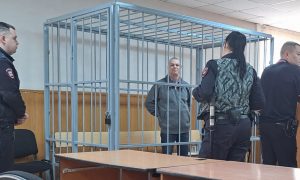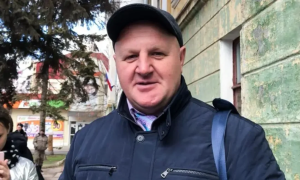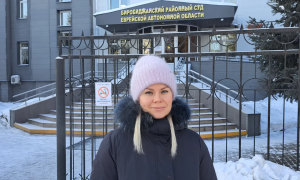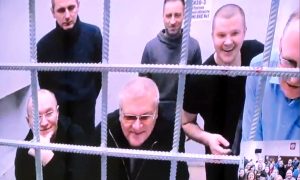On 6 October, a Sevastopol court in Russian-occupied Crimea jailed three Jehovah’s Witnesses for six years each on “extremism” charges, followed by a seven-year ban on specific activities. Prosecutor Valery Yazev, who led the case in court, refused to answer Forum 18’s questions. The three are appealing, and if this fails are likely to be – against international law – transferred to labour camps in Russia. There are currently 7 Crimean prisoners of conscience jailed for exercising freedom of religion or belief.
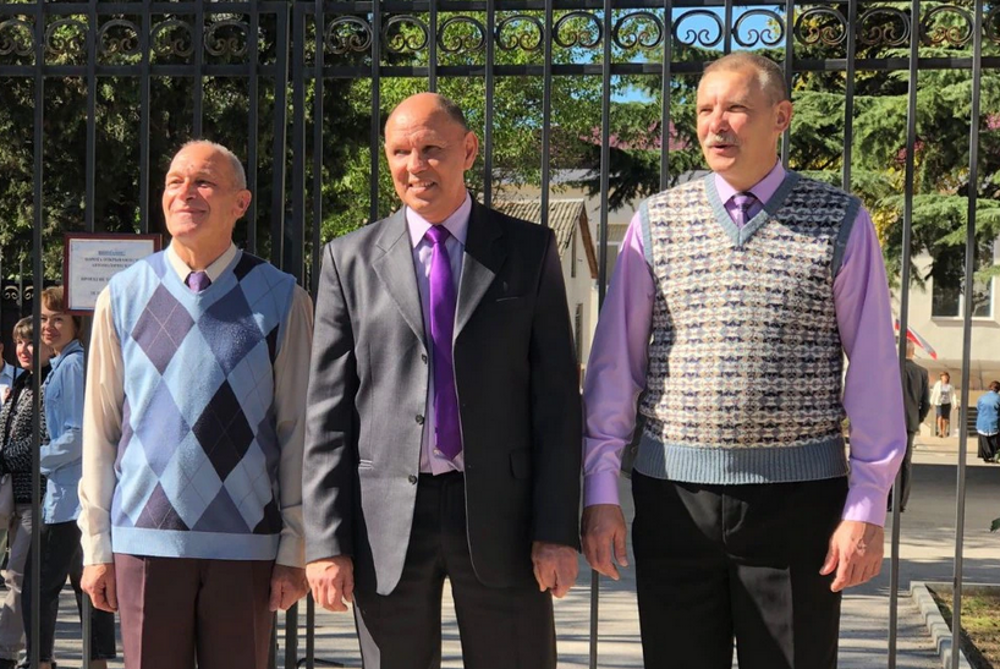
On 6 October, a Sevastopol court in Russian-occupied Crimea jailed three Jehovah’s Witnesses for six years each on “extremism” charges to be followed by a seven-year ban on specific activities. The judge sentenced Vladimir Sakada, Vladimir Maladyka, and Yevgeny Zhukov almost 18 months after prosecutors lodged the criminal cases in court in April 2021. The three are appealing against their convictions and remain in the Investigation Prison in the occupied Crimean capital Simferopol. If their appeals fail, they are likely to be – against international law – transferred to labour camps in Russia to serve their sentences.
Russia’s Supreme Court banned Jehovah’s Witnesses as “extremist” in 2017. The ban was also imposed in Crimea, which Russia illegally occupied in March 2014.
Prosecutor Valery Yazev, who led the case in court against prisoners of conscience Sakada, Maladyka and Zhukov, had demanded even harsher punishment. He refused to answer any of Forum 18’s questions about the case, including over who (if anyone) might have been victims of the men’s activity, or why he had demanded such long jail terms and post-prison bans. “They have the possibility of lodging appeals,” was all he would say (see below).
If Zhukov, Maladyka and Sakada lose their appeals, they are likely to be – like other prisoners of conscience – transferred to labour camps in Russia to serve their sentence, despite this breaking the Geneva Convention relative to the Protection of Civilian Persons in Time of War (see below).
Prosecutor Yazev had also led the prosecution case against another Sevastopol Jehovah’s Witness, Igor Schmidt. A Sevastopol court jailed him for six years in October 2021, plus a six-year post-prison ban on activities. He is among the four Crimean Jehovah’s Witness prisoners of conscience transferred to labour camps in Russia (see below).
A criminal case was also opened in September 2020 against another Jehovah’s Witness from Sevastopol, Aleksandr Kostenko, who had left Crimea half a year earlier. He remains an accused person and is on Russia’s Interior Ministry wanted list (see below).
The Office of the UN High Commissioner for Human Rights (OHCHR) has condemned “the unlawful application of Russian Federation legislation by the occupation authorities of the Russian Federation in the occupied territory [Crimea]”. OHCHR noted in its Report on the human rights situation in Ukraine for 1 August 2020 to 31 January 2021: “In Crimea, violations of international humanitarian law and international human rights law were committed by the occupying Power [Russia].” The OHCHR noted in its 28 March 2022 report that these violations included “violations of the right to freedom of religion and belief, unlawful deportations and forced transfers, including of detainees, as well as deplorable treatment and conditions in detention.”
Separately, the United Nations (UN) Human Rights Committee’s Concluding Observations (CCPR/C/RUS/CO/8), made public on 3 November 2022, have called on Russia to: “Respect and ensure freedom of religion and belief in Crimea and refrain from any interference contrary to the provisions of the Covenant [on Civil and Political Rights]” (see below).
A list of all current Crimean prisoners of conscience jailed for exercising freedom of religion or belief is at the end of this article (see below).
Other “extremism” trials continuing
Two other “extremism” criminal trials which began in April 2022 continue in Russian-occupied Crimea. Darya Kuzio, Taras Kuzio, Sergei Lyulin and Pyotr Zhiltsov are on trial in Yalta. Aleksandr Dubovenko and Aleksandr Litvinyuk are on trial in Armyansk (see forthcoming F18News article).
On 24 August, as officers raided several Jehovah’s Witness homes in the port city of Sevastopol, an investigator launched “extremism”-related criminal cases against Sergei Zhigalov and Viktor Kudinov. As the case is being investigated, the two men are under a ban on specific activity, including “visiting collective meetings of people following the Jehovah’s Witness faith” (see forthcoming F18News article).
On 28 September, officials of Russia’s Investigative Committee and Russia’s Federal Security Service – some of them armed and in masks – raided the homes of at least eight Jehovah’s Witnesses in and around Krasnogvardeiskoe in central Crimea. Officers arrested Sergei Parfenovich, and a court ordered him held in pre-trial detention until 19 November as a criminal case against him is investigated (see forthcoming F18News article).
“Extremism” convictions
On 16 February 2022, a court in Kerch convicted one individual – 31-year-old Jehovah’s Witness Artyom Shably – on “extremism”-related charges to punish his exercise of the right to freedom of religion or belief. The judge handed him a two-year suspended sentence, with three years’ probation (see below).
Seven Crimean Jehovah’s Witnesses are currently serving jail terms on “extremism” charges to punish their exercise of freedom of religion or belief (see list at end of article).
Investigators have had all seven prisoners of conscience added to the Russian Federal Financial Monitoring Service (Rosfinmonitoring) “List of Terrorists and Extremists”, whose assets banks are obliged to freeze (although small transactions are permitted). Five of the seven were added before even being convicted of any “crime”.
Russian-controlled courts in Crimea have also imposed long-term jailings of Muslim Crimean prisoners of conscience for exercising their freedom of religion and belief since the 2014 Russian invasion. The only prisoners of conscience currently jailed for exercising freedom of religion and belief are Jehovah’s Witnesses.
Raids
All these criminal cases followed raids on Jehovah’s Witness homes. Armed and sometimes masked officers of Russia’s Federal Security Service, Investigate Committee, police or other agencies typically conduct raids in the early morning, inspecting and seizing religious literature, electronic devices and money. They often detain suspects for interrogation (see below).
A press officer of the Russian Federal Security Service in Simferopol – who would not give his name – refused to explain to Forum 18 on 10 November why officers take part in armed raids on Jehovah’s Witness homes, or why they initiate criminal cases on “extremism” charges.
A press officer of Sevastopol Police – who would not give her name – refused to explain to Forum 18 on 10 November why officers take part in armed raids on Jehovah’s Witness homes, such as the raids on 24 August.
Illegal transfers to Russian prisons
Four Crimean Jehovah’s Witness prisoners of conscience jailed on “extremism”-related charges in 2020 and 2021 were transferred to Russia to serve their sentences. Three of the four are jailed in Rostov-on-Don, the fourth in Krasnodar Region (see list at end of article).
The Geneva Convention relative to the Protection of Civilian Persons in Time of War covers the rights of civilians in territories occupied by another state (described as “protected persons”). Article 76 includes the provision: “Protected persons accused of offences shall be detained in the occupied country, and if convicted they shall serve their sentences therein.”
Russia’s March 2014 annexation of Crimea is not recognised by Ukraine or internationally.
Also, Rule 59 of the United Nations Standard Minimum Rules for the Treatment of Prisoners (known as the Mandela Rules – A/C.3/70/L.3) states: “Prisoners shall be allocated, to the extent possible, to prisons close to their homes or their places of social rehabilitation.”
UN Human Rights Committee “serious concern” over freedom of religion or belief violations
Freedom of religion and belief is, along with other human rights, severely restricted within the Russian-occupied Ukrainian territory of Crimea. Violations include: forced imposition of Russian laws and restrictions on exercising human rights, including freedom of religion or belief; jailing Muslim and Jehovah’s Witness Crimean prisoners of conscience; forcible closure of places of worship; and fining people for leading meetings for worship without Russian state permission.
In its delayed consideration of Russia’s human rights record under the International Covenant on Civil and Political Rights, the United Nations Human Rights Committee also covered Russian-occupied Crimea as it is “under the effective control” of Russia.
The Human Rights Committee’s Concluding Observations (CCPR/C/RUS/CO/8), made public on 3 November, expressed concern about Russia’s “infringements of the freedom of religion, targeting, inter alia, Jehovah’s Witnesses”.
On Crimea, the Committee noted “with serious concern reports of violations of freedom of religion and belief in Crimea, including intimidation and harassment of religious communities, such as the Orthodox Church of Ukraine and the Muslim Community”.
The Human Rights Committee called on Russia to: “Respect and ensure freedom of religion and belief in Crimea and refrain from any interference contrary to the provisions of the Covenant [on Civil and Political Rights].”
Sevastopol: Raids, arrests
On 30 September 2020, the Russian Federal Security Service launched a case in the port city of Sevastopol against Jehovah’s Witness Aleksandr Viktorovich Kostenko (born 15 July 1991) under Russian Criminal Code Article 282.2, Part 1.
Russian Criminal Code Article 282.2, Part 1 punishes “Organisation of the activity of a social or religious association or other organisation in relation to which a court has adopted a decision legally in force on liquidation or ban on the activity in connection with the carrying out of extremist activity” with a possible punishment of six to 10 years’ imprisonment or a fine of 400,000 to 800,000 Roubles.
On 1 October 2020, Lieutenant Aleksandr Chumakin of the Russian Federal Security Service opened cases under Russian Criminal Code Article 282.2, Part 1 against three Sevastopol Jehovah’s Witnesses: Vladimir Fedorovich Sakada (born 4 October 1970), Vladimir Ivanovich Maladyka (born 8 July 1963), and Yevgeny Sergeyevich Zhukov (born 19 November 1969).
Zhukov was the head of the legally-registered Jehovah’s Witness community in Sevastopol before it was forcibly liquidated in May 2017.
Lieutenant Chumakin’s telephone went unanswered each time Forum 18 called between 8 and 10 November 2022.
In the early morning of 1 October 2020, officers raided at least nine Jehovah’s Witness homes in Sevastopol. Over the next six hours they conducted thorough searches, seizing electronic devices. They detained Zhukov, Maladyka and Sakada (as well as Igor Shmidt who was jailed separately – see below) and took them to Investigation Prison No. 1 in Simferopol. The three spent more than six months in the Investigation Prison before being transferred to house arrest.
“They burst into our home at 6 o’clock in the morning,” Natalya Maladyka – wife of one of the detailed men – told human rights group Crimean Solidarity in November 2020. “They took a radio and all our [electronic] devices. We don’t understand why they treat us like that.” Svetlana Sakada, wife of another of the detainees, insisted that her husband “has conducted no crimes against the foundations of the state”. She added: “My husband does not admit any guilt.”
Investigators had all four men added on 13 July 2021 to the Russian Federal Financial Monitoring Service (Rosfinmonitoring) “List of Terrorists and Extremists”, whose assets banks are obliged to freeze (although small transactions are permitted).
No criminal case is known to have been handed to court against Kostenko, who left Crimea in spring 2020. He remains an accused person and is on Russia’s Interior Ministry wanted list.
Sevastopol: 6-year jail terms, 7-year bans, 1 year’s restrictions on freedom
On 12 May 2021, the trial began under Judge Olga Berdnikova at Sevastopol’s Nakhimov District Court of the three Jehovah’s Witnesses: Vladimir Sakada, Vladimir Maladyka, and Yevgeny Zhukov. Prosecutors brought the cases under Russian Criminal Code Article 282.2, Part 1.
Numerous court hearings took place in the case, according to court records. The Judge rejected numerous procedural complaints submitted by the defence.
The prosecution used four videos of the defendants praying, singing and discussing the Bible on Zoom between December 2019 and January 2020 which had been secretly recorded by agents of the Russian Federal Security Service, Jehovah’s Witnesses noted. Sakada told the court that the video “had been subjected to unapproved changes”. The court refused to allow a forensic examination of the videos.
The court used several secret witnesses, whose identity the prosecution would not reveal and whose testimony could not therefore be challenged.
Russian Federal Security Service (FSB) officer Dmitry Shevchenko, who had led the investigative measures, told the court that there had been no signs of “extremism” or “incitement of religious hatred” in the defendants’ activity. He said he had been familiar with their activity in Sevastopol since 2015, and that their meetings had always been exclusively religious.
Russian FSB officer Shevchenko was also involved in the March 2021 jailing of 54-year-old prisoner of conscience Jehovah’s Witness Viktor Stashevsky for six and a half years, with a further seven years under restrictions due to end in 2034.
Sakada, Maladyka, and Zhukov rejected the charges and called for an acquittal. They pointed out that the prosecution case accused them of conducting illegal religious activity from 2015, although at that time the Sevastopol Jehovah’s Witness community had official registration and its activities would not yet be banned as extremist until 2017.
Prosecutor Valery Yazev told the court that Sakada, Maladyka, and Zhukov were fully guilty and called for each to be given a seven-and-a-half-year general regime labour camp term; a ban on the right to teach, speak through the media, or post material online for 8 years after they have completed their jail term; and restrictions on freedom for 1 year after they have completed their jail term.
Russian Prosecutor Yazev was also the prosecutor in the case that led to the October 2021 jailing of 49-year-old Jehovah’s Witness Igor Schmidt for six years on “extremism”-related charges, to be followed by a six-year ban on specific activities. The prosecution presented no victims of any wrongdoing in court.
“Using their authority as spiritual leaders with participants of meetings,” Yazev claimed in the cases of Sakada, Maladyka, and Zhukov. “Zhukov and Kostenko quoted extracts from the given literature, held discussions on the texts they had read in a question and answer format, posing clarifying questions inciting other participants to give their own opinion.”
Yazev concluded: “They committed a serious crime against the constitutional order and security of the state.”
Zhukov, Maladyka and Sakada arrived for the final hearing of their trial on 6 October 2022 with large bags of essential items in case they were sentenced to prison and taken into custody in the courtroom after the verdict was handed down, human rights defender Lutfiye Zudiyeva wrote on the Ukrainian news website Graty the same day.
Dozens of supporters came to the court, not only from Sevastopol but from Dzhankoi and Armyansk, and applauded the men as they arrived. Only ten supporters were allowed into the courtroom to hear the verdict. The Judge banned them from taking photos or filming the proceedings.
Judge Berdnikova found the three prisoners of conscience guilty of violating Russian Criminal Code Article 282.2, Part 1, according to the court website.
Judge Berdnikova punished all three men with:
– a six-year general regime labour camp term;
– a ban on the right to teach, speak through the media, or post material online for 7 years after they have been released from prison;
– and restrictions on freedom for 1 year after they have completed their jail term.
“We were prepared for this,” Olga Yanovskaya, Zhukov’s sister, told Radio Liberty’s Crimean Service outside the court after the verdict had been handed down. “It was not a shock.”
“One phrase they used which made an impression was that there were no other measures for ‘correcting’ them apart from doing this in a labour camp,” Svetlana Sakada, Sakada’s wife, told Radio Liberty outside the court. “We don’t understand what they need to correct.”
Svetlana Sakada added that the three men would appeal against their conviction “because they are not in any way guilty”.
Prosecutor Yazev refused to answer any questions about the case from Forum 18 on 10 November, including who (if anyone) might have been victims of the men’s activity, or why he had demanded such long jail terms and post-prison bans. “They have the possibility of lodging appeals,” was all he would say.
After taking prisoners of conscience Zhukov, Maladyka and Sakada into custody in the courtroom at the end of the trial, officers took them to Investigation Prison No. 1 in the Crimean capital Simferopol, some 80 kms (50 miles) from Sevastopol.
The address of Investigation Prison No. 1 is:
295006 Respublika Krym
g. Simferopol
bul. Lenina 4
FKU Sledstvenny izolyator No. 1 UFSIN Rossii po Respublike Krym i g. Sevastopolyu
Sakada, Maladyka, and Zhukov, as well as their lawyers, lodged appeals on 17 and 18 October to Sevastopol City Court via Nakhimov District Court, according to the court website. The City Court lists no date yet for any appeal hearings.
If Zhukov, Maladyka and Sakada lose their appeals, they are likely to be transferred to labour camps in Russia to serve their sentence, despite this breaking the Geneva Convention relative to the Protection of Civilian Persons in Time of War (see above).
Kerch: Suspended sentence
On 16 February, Judge Irina Altanets of the City Court in the eastern Crimean city of Kerch found Jehovah’s Witness Artyom Alekseyevich Shably (born 11 November 1990) guilty under Russian Criminal Code Article 282.2, Part 1.1 (“Inclination, recruitment or other involvement of a person in an extremist organisation”), according to court records. The Judge handed him a two-year suspended sentence, with a three-year probationary period. The prosecutor had called for a three-year suspended sentence.
The probationary period (ispytatelny srok) is the time during which any other conviction would send the defendant to prison. It is counted from the day the verdict comes into force and may be longer or shorter than the sentence itself, or of the same length.
Shably did not appeal against the conviction.
In the early morning of 26 May 2020, separate groups of seven to 10 armed Russian police and OMON riot police officers in masks raided five homes in Kerch. Officers searched the homes for up to three hours and seized documents, publications and electronic devices. In no case did they show a court order authorising the raids, nor did they provide a record of what they called a “survey”.
Officers broke the window in the hallway to gain entrance. Shably’s four-year-old son cut his foot on the broken glass lying on the floor. Officers put Shably in handcuffs, forcing him to stand with his head against the wall for several hours in light clothing in the cold wind through the door and broken window before taking him away. He remained in handcuffs for several hours. He was held in the police detention centre for two days.
The Investigative Committee initially launched a criminal case against Shably in March 2020 under Russian Criminal Code Article 282.2, Part 2 (“Participating in” a banned alleged “extremist” organisation). Investigators then changed the charge to Russian Criminal Code Article 282.2, Part 1.1.
Prosecutors used a secretly-recorded conversation Shably had with an individual who claimed to be interested in learning more about the Bible.
Vladimir Zarubin, Investigator for Especially Important Cases at the Investigative Committee in Kerch who had opened the case, refused to discuss it with Forum 18 in March 2021, insisting on the “secrecy of the pre-trial investigation”.
Shably’s nine-month trial began at Kerch City Court on 24 May 2021.
Current Crimean prisoners of conscience jailed for exercising freedom of religion or belief
Seven Crimean Jehovah’s Witnesses are currently serving jail terms on “extremism” charges to punish their exercise of freedom of religion or belief. Four of these have been transferred to prisons in Russia. The other three are still in Investigation Prison awaiting the appeal decision.
Occupied Crimea is administered by Russia in two federal subjects or regions following the Ukrainian administrative divisions, the Republic of Crimea and the city of Sevastopol.
– Republic of Crimea
1) Sergei Viktorovich Filatov (born 6 June 1972)
Added to Rosfinmonitoring List: 17 January 2019
Sentenced: 5 March 2020, Dzhankoi District Court
Russian Criminal Code Article: 282.2, Part 1
Punishments: 6 years + after release 5 year ban on educational activity, speaking publicly and publishing in the media and on the internet
Appeal: unsuccessful – 26 May 2020, Supreme Court of the Republic of Crimea
Due for release from prison: 23 January 2026
Restrictions on freedom due to end: 23 January 2027
Ban on activities: 23 January 2026 to 23 January 2031
Sudimost, administrative supervision and being on Rosfinmonitoring List due to end: 23 January 2035
Prison address: 344033, g. Rostov-na-Donu, per. Kazachy 22, FKU Ispravitelnaya koloniya No. 10 UFSIN Rossii po Rostovskoi oblasti, Russian Federation
2) Artyom Vyacheslavovich Gerasimov (born 13 January 1985)
Added to Rosfinmonitoring List: 2 July 2020
Sentenced: 5 March 2020, Yalta City Court
Russian Criminal Code Article: 282.2, Part 1
Punishments: fine of 400,000 Russian Roubles
Appeal: changed to 6 years’ imprisonment – 4 June 2020, Supreme Court of the Republic of Crimea
Due for release from prison: 3 June 2026
Restrictions on freedom due to end: unknown
Sudimost, administrative supervision and being on Rosfinmonitoring List due to end: no later than 3 June 2036
Prison address: 344033, g. Rostov-na-Donu, per. Kazachy 22, FKU Ispravitelnaya koloniya No. 10 UFSIN Rossii po Rostovskoi oblasti, Russian Federation
– Sevastopol
3) Viktor Vladimirovich Stashevsky (born 11 July 1966)
Added to Rosfinmonitoring List: 11 July 2019
Sentenced: 29 March 2021, Gagarin District Court
Russian Criminal Code Article: 282.2, Part 1
Punishments: 6 years 6 months’ jail + after release 7 year ban on educational activity, speaking publicly and publishing in the media and on the internet
Appeal: unsuccessful – 10 August 2021, Sevastopol City Court
Due for release from prison: 24 July 2027
Restrictions on freedom due to end: 24 July 2028
Ban on activities: 24 July 2027 to 24 July 2034
Sudimost, administrative supervision and being on Rosfinmonitoring List due to end: 24 July 2036
Prison address: 352671, Krasnodarsky krai, Apsheronsky raion, g. Khadyzhensk, ul. Griboyedova 42, FKU Ispravitelnaya koloniya No. 9 UFSIN Rossii po Krasnodarskomu krayu, Russian Federation
4) Igor Yakovlevich Schmidt (born 18 June 1972)
Added to Rosfinmonitoring List: 17 February 2022
Sentenced: 22 October 2021, Gagarin District Court
Russian Criminal Code Article: 282.2, Part 1
Punishments: 6 years + after release 6 year ban on educational activity, speaking publicly and publishing in the media and on the internet
Appeal: unsuccessful – 13 January 2022, Sevastopol City Court
Due for release from prison: 9 September 2026
Restrictions on freedom due to end: 9 September 2027
Ban on activities: 9 September 2026 to 9 September 2032
Sudimost, administrative supervision and being on Rosfinmonitoring List due to end: 9 September 2035
Prison address: 344033, g. Rostov-na-Donu, per. Kazachy 22, FKU Ispravitelnaya koloniya No. 10 UFSIN Rossii po Rostovskoi oblasti, Russian Federation
5) Vladimir Fedorovich Sakada (born 4 October 1970)
Added to Rosfinmonitoring List: 13 July 2021
Sentenced: 6 October 2022, Nakhimov District Court
Russian Criminal Code Article: 282.2, Part 1
Punishments: 6 years + after release 7 year ban on educational activity, speaking publicly and publishing in the media and on the internet
Appeal: being lodged to Sevastopol City Court
Due for release from prison: unknown
Restrictions on freedom due to end: one year after release from prison
Ban on activities due to end: 7 years from end of prison term
Sudimost, administrative supervision and being on Rosfinmonitoring List due to end: 8 years from end of restrictions on freedom
Detention centre address: 295006 Respublika Krym, g. Simferopol, bul. Lenina 4, FKU Sledstvenny izolyator No. 1 UFSIN Rossii po Respublike Krym i g. Sevastopolyu
6) Vladimir Ivanovich Maladyka (born 8 July 1963)
Added to Rosfinmonitoring List: 13 July 2021
Sentenced: 6 October 2022, Nakhimov District Court
Russian Criminal Code Article: 282.2, Part 1
Punishments: 6 years + after release 7 year ban on educational activity, speaking publicly and publishing in the media and on the internet
Appeal: being lodged to Sevastopol City Court
Due for release from prison: unknown
Restrictions on freedom due to end: one year after release from prison
Ban on activities due to end: 7 years from end of prison term
Sudimost, administrative supervision and being on Rosfinmonitoring List due to end: 8 years from end of restrictions on freedom
Detention centre address: 295006 Respublika Krym, g. Simferopol, bul. Lenina 4, FKU Sledstvenny izolyator No. 1 UFSIN Rossii po Respublike Krym i g. Sevastopolyu
7) Yevgeny Sergeyevich Zhukov (born 19 November 1969).
Added to Rosfinmonitoring List: 13 July 2021
Sentenced: 6 October 2022, Nakhimov District Court
Russian Criminal Code Article: 282.2, Part 1
Punishments: 6 years + after release 7 year ban on educational activity, speaking publicly and publishing in the media and on the internet
Appeal: being lodged to Sevastopol City Court
Due for release from prison: unknown
Restrictions on freedom due to end: one year after release from prison
Ban on activities due to end: 7 years from end of prison term
Sudimost, administrative supervision and being on Rosfinmonitoring List due to end: 8 years from end of restrictions on freedom
Detention centre address: 295006 Respublika Krym, g. Simferopol, bul. Lenina 4, FKU Sledstvenny izolyator No. 1 UFSIN Rossii po Respublike Krym i g. Sevastopolyu


